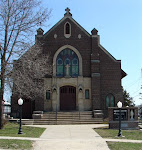Recommended by Father Pisut
Stem Cell Position Ignores Sacredness of All Life
This editorial was written by Bishop Richard Pates and printed in the DesMoines Register.
As the stem cell controversy continues, the Register editorial board implores the use of reason when considering the "promise" of stem cell research ("Embryonic Stem Cells Promise Much," Sept. 16). The Catholic Church assiduously supports adult stem cell research and with the exercise of reason proclaims the human embryo is human life with potential and not a potential human life. Human life is sacred from the very beginning because it has been "created in the image of God." Moreover, the board quite arbitrarily and without philosophical or biological illustration dismisses personhood for the individual human being whose life begins at fertilization.
Reasoned discussion requires that we present factual information in order to assist our decision making regarding stem cell research. Three broad classes of stem cells exist: embryonic, adult and reprogrammed. Human embryonic stem cells are obtained by the destruction of human embryos between three and six days old. These cells are said to be pluripotent, i.e., able to produce all cell types found in the human body.
Adult stem cells are found in older tissue as with an older embryo, fetus or adult and are believed to be more limited in that they make only those types of cells of the tissue in which they reside. Adult stem cells are referred to as multipotent.
Finally, somatic cells from an adult human can be reprogrammed to a state very similar to a human embryonic stem cell. While not identical to embryonic stem cells, these reprogrammed cells, iPSCs, function in the same way as embryonic stem cells - that is they are pluripotent, able to produce all of the cells of the mature body.
What hope do embryonic stem cells give? There are serious safety issues with embryonic stem cells, as it is difficult to control their replication and often result in tumor production. Embryonic stem cells can also convert to cancer cells. Producing clinically safe embryonic stem cells has eluded investigators for over 25 years. Furthermore, attempts to clone stem cells in the hope of removing immune rejection from the recipient poses issues in that such cloned stem cells are genetically abnormal. Embryonic stem cells have not successfully treated or cured a single medical condition.
In contrast, adult stem cell therapies have been used to treat medical conditions for decades, and have delivered on the promise of benefit or cure in over 70 medical conditions. As of March 2009, a search of the federal database revealed 2,461 currently funded clinical trials using adult stem cells.
Reprogrammed adult somatic cells (iPSCs) that result in pluripotent stem cells appear to hold promise for future therapies and avoid many of the hurdles posed by embryonic stem cells. Specifically, reprogrammed stem cells are patient specific, thus avoiding immune rejection by the recipient. They are pluripotent, no more likely to produce cancer than embryonic stem cells and producing stable cell lines appears less difficult than with embryonic stem cells.
Lastly, let us look at the complexity of this "tiny clump of cells," the "left over" human life that the author so eagerly desires to kill. The single-cell embryo contains over a trillion molecules whose organized interactivity is controlled. The energy needed for all the activities of the cell is supplied by up to a thousand tiny mitochondria located in the cytoplasm. DNA is located in the nuclear chromosomes and carries the codes that program inheritance and cellular and organ development. As Tertullian said, "What will become human is already human;" or if you prefer Dr. Seuss, "A person is a person no matter how small."



